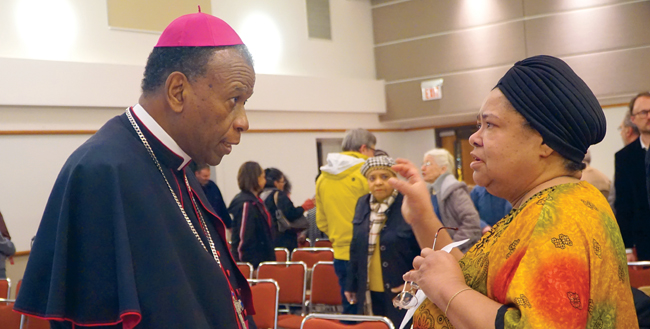By RUBY THOMAS
Special to The Messenger
Those who attended the Annual Thomas Merton Black History Month Lecture at Bellarmine University in Louisville, Ky., Feb. 21 heard Bishop Edward K. Braxton say that in order to bridge the racial divide in the United States one must listen, learn, think, pray and act.
Bishop Braxton delivered an address on “Thomas Merton and the Racial Divide in the United States: The Catholic Church and the Black Lives Matter Movement.”
Th bishop opened with prayer for shooting victims at Marjory Stoneman Douglas High School in Parkland, Fla. Before he delved into his presentation, the bishop told his listeners that the topics his lecture would cover are “complex.”
The writings of Thomas Merton, which influenced him as a seminarian, priest and bishop, “provoke a variety of opinions that are not simple matters,” said Bishop Braxton. The role the Catholic Church in the U.S. played in “creating and bridging the racial divide” is not a simple one either, he said. “It’s a complex one and as real as the headlines of this morning’s newspaper.”
If individuals are to build bridges that will close the racial divide, they must listen to what’s happening in the world — listen to one’s self, to one’s neighbor, to the teachings of the Catholic Church, to the teachings of the Gospel, to those with whom one disagrees and to those on the other side of the racial divide, he explained.
Most important, said the bishop, “If you listen, learn, think, pray and do nothing, the racial divide will never be bridged. You must act.”
The shooting of young black men by white police officers, the protests that followed and the rise of the Black Lives Matter movement brought that divide into focus, the bishop said.
Ideally, all lives should matter to every human being, but one need look no further than the headlines to realize that “in today’s world everyone’s life does not matter,” said Bishop Braxton, recalling the Feb. 14 shooting at Marjory Stoneman Douglas High in Parkland, Fla.
In the Gospel, Jesus Christ uses the parable of the Good Samaritan to teach that all lives matter, said the bishop. Christ teaches “the law of love” and asks us to go forth and act like the Good Samaritan.
Because the Gospel makes it clear that all lives matter and, therefore black lives matter, some believe the discussion is moot, said the bishop. But that’s not the case, he said.
For those who are part of the Black Lives Matter movement, this “seemingly obvious truth” has not been sufficient. “Why is this?” asked Bishop Braxton.
He used the analogy of a starving family who knocks on the door of a comfortable family on a cold stormy night, begging for shelter and food. The comfortable family at first refuses to help and points the starving family to a shelter five miles away. The comfortable family, however, has an insight which allows them to see that at this moment, the starving family’s life was in peril. It’s not that the lives of members of the starving family mattered more than those of the comfortable family, but at that moment their lives were in peril, said Bishop Braxton. If the family understands the Gospel teachings, they also understand that they must act.
“Some would say it is at this moment, as it has been in so many moments, that the lives of African-Americans are in peril,” said Bishop Braxton. “It’s not enough to say, ‘Make your way to the shelter, five cold rainy miles away.’ ”
Many question the ideology and motives of the Black Lives Matter movement, said Bishop Braxton. Some members of the clergy who serve in urban areas and members of the faithful question whether the movement wouldn’t be better off focusing on black-on-black crime.
Despite a contrast in beliefs between the Black Lives Matter movement and the Catholic Church, Bishop Braxton said he believes both may benefit from conversation. At least for the church to become “better informed about this movement and its growing influence,” he said.
The movement “embraces those who many people might be embarrassed by — those who are disabled, undocumented, homosexual, transgendered,” said the bishop. These are issues that many Catholics would prefer to be silent on, he noted. Everyone must be committed, he said, to “listen, learn, think, pray and act.”
The bishop said he believes in the words of St. Teresa of Kolkata who said that everybody can do something. One individual may not be able to change political structures, but he can do something to bridge the racial divide, he said. Individuals can strive to follow Christ and his “law of love” by standing up and speaking out for those on the margins.
“You can say to those belittling people, because of race, religion, nationality, social or sexual situation that ‘this is not consistent with the teachings of Jesus Christ.’ ” He added, individuals too can do something locally to make a difference or perhaps even learn more about the Black Lives Matter movement.
Finally, said Bishop Braxton, individuals might turn to Thomas Merton and the account of his famous epiphany, which goes to the heart of the “truth that black lives matter because all lives matter and all lives matter because black lives matter.”
Merton writes of his now-famous epiphany in downtown Louisville:
“I was suddenly overwhelmed with the realization that I loved all those people, that they were mine and I theirs, that we could not be alien to one another even though we were total strangers. It was like waking from a dream of separateness, of spurious self-isolation in a special world, a world of renunciation and supposed holiness. … I have the immense joy of being man, a member of a race in which God Himself became incarnate.”







